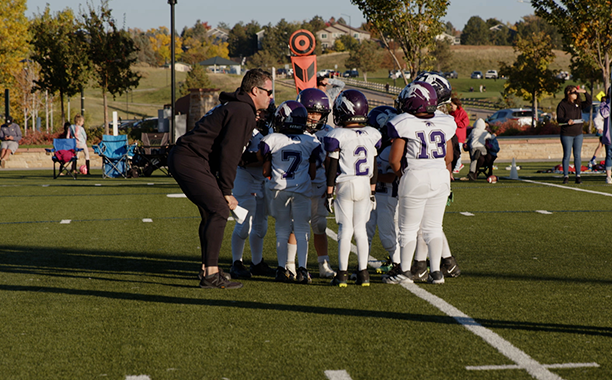In the workaday world, Joshua Hotchkiss is a senior attorney at the law firm of Franklin D. Azar & Associates, fighting for the rights of his clients. But after work and on weekends, he has another vocation that he takes just as seriously: being the head coach of a group of third-graders playing competitive tackle football in the Arapahoe Youth League.
Hotchkiss’s Spartans have had considerable success under his guidance. The team proudly proclaims themselves the “defending Super Bowl champions,” having won their age-group division last season and made it back to the playoffs this year before being eliminated in the quarterfinals. His colleagues are puzzled when they learn that Hotchkiss spends much of his spare time teaching football fundamentals to eight- and nine-year-olds, but he is passionate about team sports and the values they can help instill in young people.
“My background is not like that of most attorneys,” he admits. “My life experiences are not the ordinary attorney track. Most attorneys think that football is a dangerous sport. I’m more worried about childhood diabetes, processed foods, and the Internet.”
Coming from what he describes as a “disadvantaged background,” Hotchkiss found purpose and confidence in team sports as a youth. “One of the things that I could find shelter in, and reward in, is football,” he says. “The harder you work, the better the results.”
A standout at linebacker, Hotchkiss became the all-time leading tackler at Western State College and a two-time Rocky Mountain Athletic Conference Defensive Player of the Year. He played for the New York Giants as a free agent and then with the Amsterdam Admirals in NFL Europe. He worked in law enforcement for the City of Arvada and Jefferson County for ten years before going to law school. A few years ago he began coaching his son John’s flag football team; when flag football was canceled as a result of the pandemic, first-grader John joined a third-grade “rookie tackle” team, a kind of hybrid version of the game for younger players, involving eight-player squads, a shortened field, and no punts. He was soon joined by some of his flag-football buddies, forming the core of the Spartan team that won the championship last season.
Hotchkiss says his group comes from diverse home lives, some more challenging than others, but have bonded together through teamwork. They may seem undersized compared to many other teams in their age group, but they also exhibit incredible discipline, executing complicated shifts designed to confuse their larger opponents.
“We don’t have the horses to line up and shove it down your throat,” Hotchkiss concedes. “But we are a very disciplined little group. Kids may begrudge discipline, but at the end of the day, they love it. I tell the parents that the number one thing we do is develop young men.”
Winning has a place in the agenda he pushes, the coach says, but it’s part of a larger process: “Without question, we want to win. Winning does a lot of things. It builds confidence, it’s a reward that makes the horrible drudgery of practice pay off. But you win games Tuesday and Friday at practice, and then you collect on Saturday. Part of the winning is you don’t do anything for yourself. It’s not about you, it’s about the guy next to you. It’s about the team. Winning is part of the process; it’s not win at all costs.”
The team had a couple losses early this year that Hotchkiss regards as instructive. “We were so worried about winning that we forgot what gets you there,” he says. “It was a good lesson for us.”
The Spartans play hard. Coach Hotchkiss tells them, “Don’t be denied.” He tells them they are made of iron. He tells them they are the bump in the night that other teams have to watch out for. The words take hold, building strong contenders, confident athletes. But events on the field help to remind him that his team is made up of kids, “the coolest eight-year-olds ever.” Like the time his son — known to his teammates as “The Mailman,” because he routinely delivers — came to him with an urgent question in the middle of a frantic game.
“Dad,” his son said. “Are penguins mean?”




